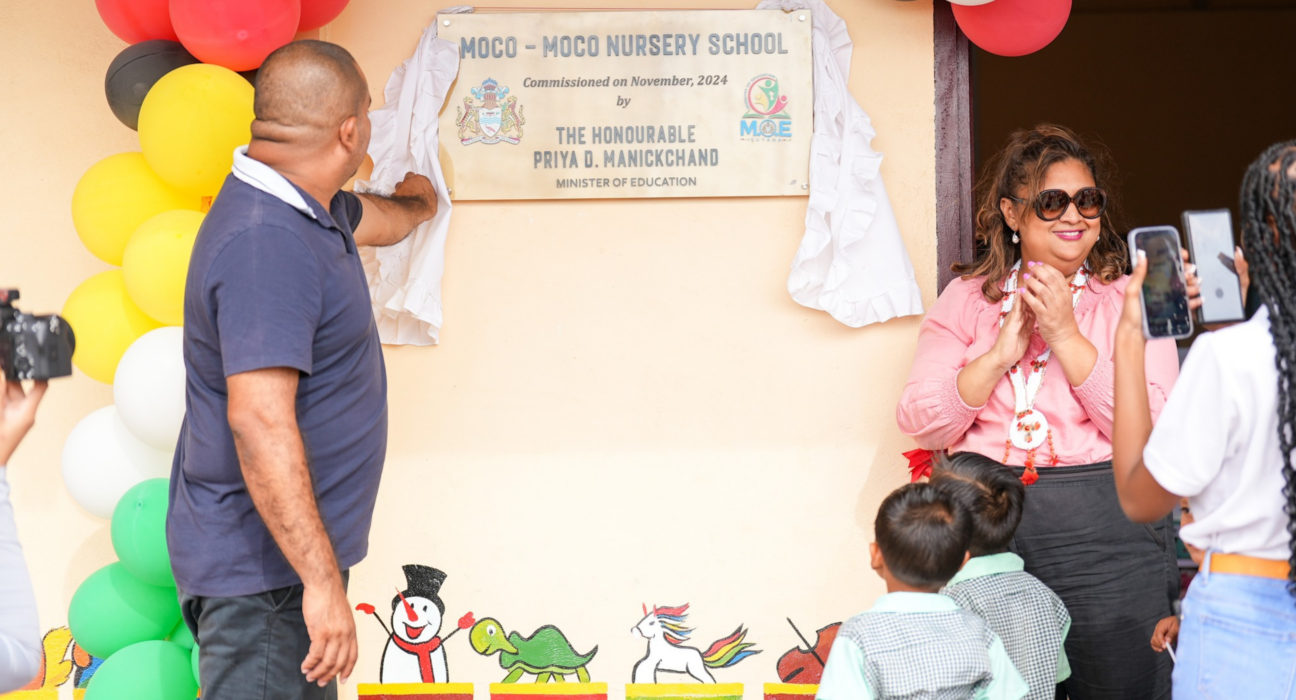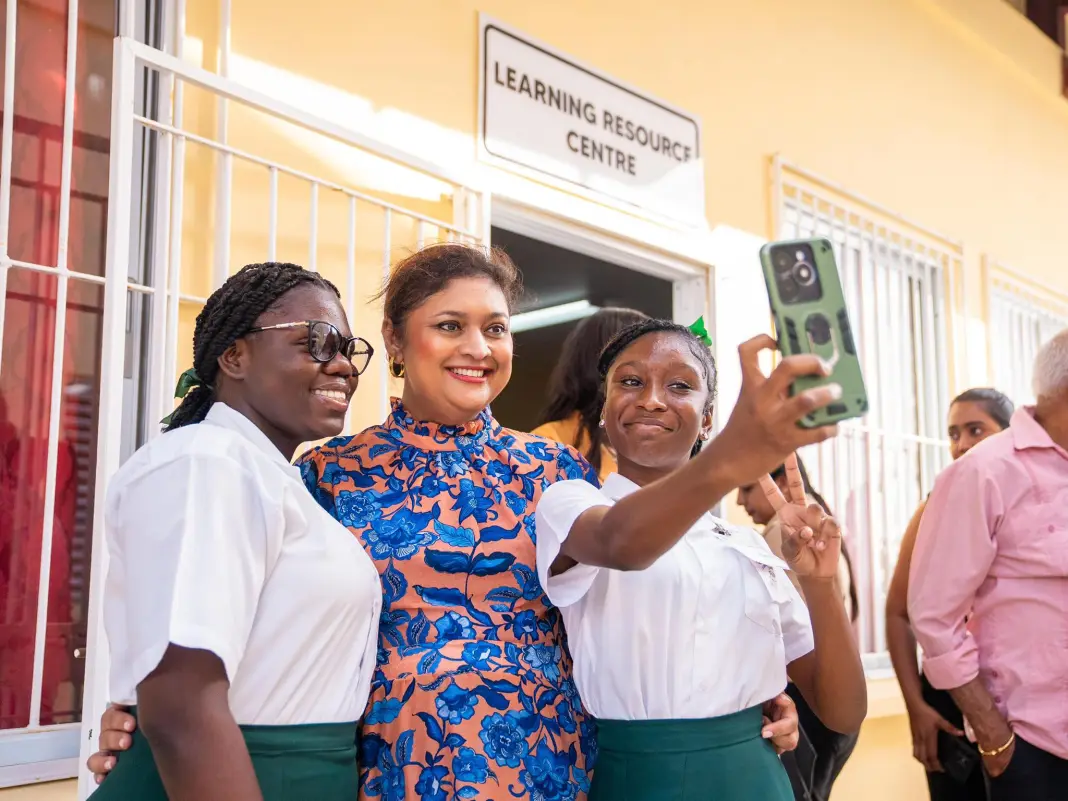Legal Aid…
A GINA Feature
More than two decades ago, brutalised women were forced to endure severe beatings at the hands of their partners since financial constraints prevented them from seeking justice.
Today, Ronetha Barton, who has suffered frequent, violent attacks for many years, can divorce her husband at little or no cost by walking into the Guyana Legal Aid Clinic.
 Minister of Human Services and Social Security (at left) and Chairman of the Board of Directors Ashton Chase tour the Essequibo Legal Aid Clinic. |
|
The clinic was formed to provide legal aid to persons who cannot afford to employ the services of a private attorney and to improve access to justice for the underprivileged.
It has a mandate to provide free or subsidised legal advice/representation to those who, due to a lack of means, are in danger of having their rights infringed upon or would otherwise have their need for representation unmet due to poverty.
The agency also has a duty to refer persons requiring non-legal help to the appropriate agencies.
However, the Legal Aid Clinic, which was initially opened in 1973 by a group of lawyers, has a very interesting history.
In an interview with Government Information Agency (GINA), Minister of Human Services and Social Security, Priya Manickchand, said the clinic was shut down 10 years later due to a lack of government funding.
At the launch of the Berbice Centre, Former Director of the Legal Aid Clinic, Miles Fitzpatrick, explained that the government of the day had a more sinister motive.
Fitzpatrick said the PNCR government “was extremely sensitive about this institution that was started by independent lawyers” and claimed that no third world country could afford such a system.
They feared that the clinic was too independent and could have held the party liable to civil and other legal actions. “Thanks to the democratic revolution of 1992, we have a legal aid system today,” Fitzpatrick said.
A document written by Ian McDonald and dated February 1983 stated that among the precepts which should be observed in any reasonably well-organised society is that coverage must be provided for the old, poor, weak, disadvantaged and the sick.
 The audience at the opening of the Linden Legal Aid Centre. |
|
“…As of 1st February this year, the Legal Aid Centre closed its doors, with the result that the poor, the uneducated, the disadvantaged and the helpless old can no longer get legal help or advice unless they pay for it or find a private individual with a forgiving heart to help them out. This is a bad, sad business – a sign of the society retrogressing into selfishness and lack of even elementary community spirit,” McDonald said in the statement.
He added that legal aid is neither a luxury nor does it encourage more litigation.
“And the suspicion that free, legal advice may simply be used as a focus for political disaffection cannot be long sustained in the face of the undoubted, crying need that the ordinary, confused person so often has for genuine, everyday legal help…,” the statement added.
At that time, the Legal Aid Clinic was under the direction of Attorney-at-Law Miles Fitzpatrick at the Maraj Building on Charlotte and King Streets, and reopened its doors in 1986.
However, according to Minister Manickchand, the clinic was still inaccessible to the underprivileged since it serviced only Georgetown and its environs.
In 1994, it was resuscitated and provided with attorneys on secondment, rent-free office space, and an annual subvention from the Government, along with assistance from USAID.
Thousands benefitting
Following its resuscitation, the clinic has been instrumental in assisting over 10,000 people in finding a sense of justice and vindication.
True to its commitment to improve access to justice for the poor and disadvantaged, in early 2008, the Government provided $32M to ensure the expansion of legal aid services.
With the funding, the clinic was recently able to expand into several regions and has now incorporated juvenile justice into the list of available services.
The clinic is a non profit-making organisation which operates at a monthly cost of $2.6m in Regions 2, 4, 5, 6, as well as a separate office in Region 10.
Minister Manickchand said the current administration had committed to expanding legal services throughout the country.
“…the only role the administration plays in the legal system is to provide funding and ensure that the services are provided to everyone,” the minister said.
She added, “Legal aid is supposed to give you a doorway into the court system and that is why we are very keen on ensuring that legal aid is accessible”.
Legal Aid’s Office Manager Gaitre Persaud told GINA that the clinic has received almost 200 complaints for the month of September, the majority being domestic violence and divorce actions.
Of these cases, 113 have been filed by women, while 76 males have sought the services of the clinic.
Persaud explained that the clients are screened by a research officer to ensure that they are eligible for legal aid, meaning that they are financially incapable of hiring a lawyer to handle their case, or in other cases, they are referred to low-cost attorneys.
She stated that in order to access legal aid, clients come in and are issued with a date to return for consultation or are dealt with immediately, depending on the urgency of the matter.
A classic example of this is Barton, a victim of domestic violence.
Barton, who has an experience to match every mark of violence on her body, told how she almost died after being stabbed with a screw driver.
The woman disclosed that she feels confident that the clinic can help in securing financial support for her children, as well as justice for the brutality she has endured.
A mother of three girls, Barton blames her husband’s behaviour on what she describes as “an addiction to alcohol” and said she decided to seek help after the situation became “out of control”.
According to her, the man has threatened on several occasions to fatally wound her and has issued her with a three-day eviction notice.
“He said we have three days to move out of his house or he would be taking off the roof,” Barton said.
The woman’s plight is further compounded by the fact that her husband refuses to support the home and she is currently unemployed.
Barton is adamant that she will pursue a divorce and spousal and child maintenance, as well as judicial redress for the physical abuse she has suffered.
Source: http://guyanachronicle.com/2009/12/07/making-justice-affordable



